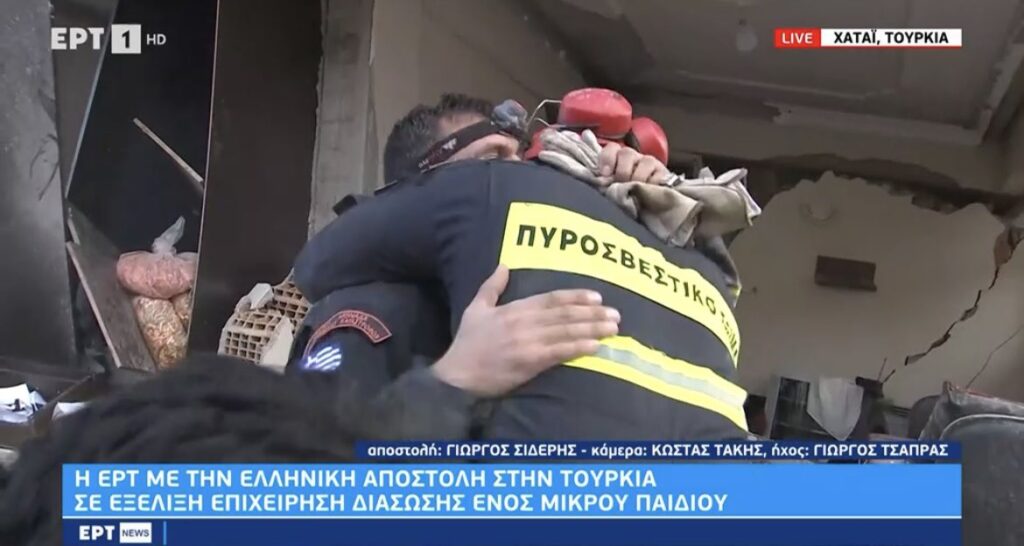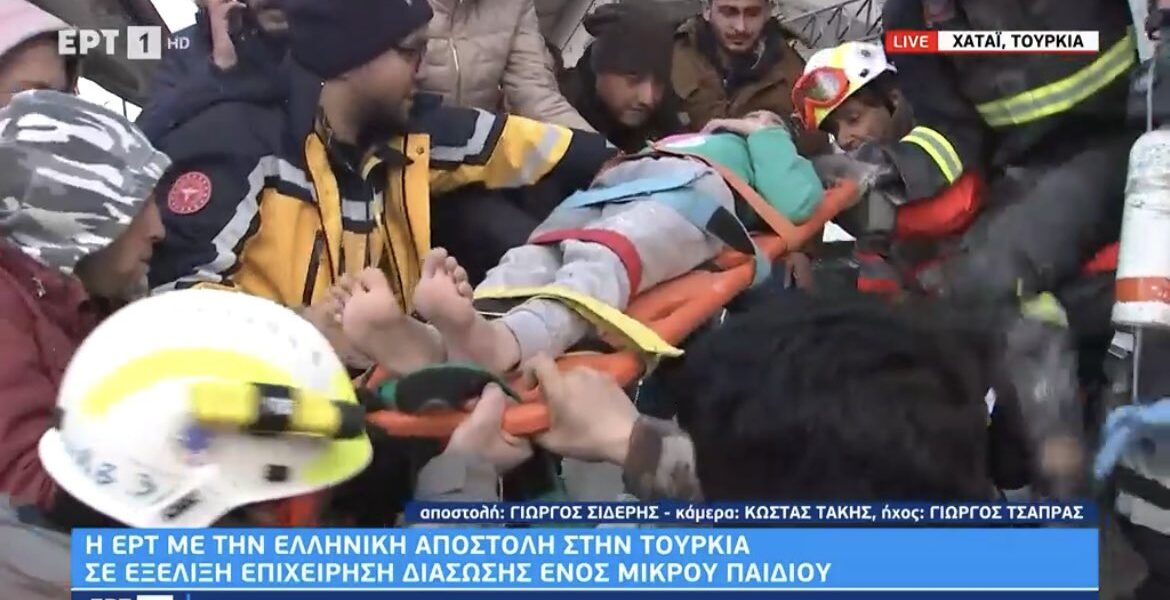The Greek crew operating in Turkey managed to rescue a six-year-old girl from the debris after many hours of efforts. The little girl was taken to the hospital and is hurt but in good condition. Her liberation caused emotion among the Greek rescuers who hugged each other.

Unfortunately, the efforts of the Greek crew to retrieve 7-year-old Fatma, sister of the six-year-old, failed as she was trapped seven metres underground after the earthquakes in Turkey. The little girl did not make it.
Using special tools, the rescuers were trying to remove pieces of cement and open a passage to reach the little girl.
An extremely emotional moment, when earlier today #Greek rescuers managed to free a 6-year-old girl from the rubble of her home in Hatay province #Turkey, before bursting into tears. pic.twitter.com/FoBAayBw6O
— Alexandros Yennimatas (@ayennimatas) February 7, 2023
The president of EARTHQUAKE PLANNING & PROTECTION ORGANIZATION (E.P.P.O.) Efthymis Lekkas explained that the building was new and suffered damage to two pillars, but in the collapse vital space was preserved which allowed the child to stay alive.
Fatma had been trapped under tons of rubble for over 24 hours, but she had found the courage to cry out. The Greek rescuers were the first to realise it and later Turkish crews arrived. One of her hands was trapped. An ambulance was also at the scene.
More than 8,000 people so far have been pulled from the debris in Turkey, said the Turkish vice-president, Fuat Oktay. About 380,000 people have taken refuge in government shelters or hotels, with others huddling in shopping malls, stadiums, mosques and community centres.
Associated Press reports that many people have posted to social media to plead for assistance for loved ones believed to be trapped under rubble, with Turkey’s state-run Anadolu news agency quoting interior ministry officials as saying that all calls were being “collected meticulously” and the information relayed to search teams.
The Turkish president, Recep Tayyip Erdoğan, said 13 million people among the country’s population of 85 million were affected in some way. He has declared a state of emergency in 10 provinces in order to manage the response. Turkey said it would only allow vehicles carrying aid to enter the worst-hit provinces of Kahramanmaraş, Adıyaman and Hatay in order to speed the effort.
Turkey has large numbers of troops in the border region with Syria and has tasked the military to aid in the rescue efforts, including setting up tents for the homeless and a field hospital in Hatay province. The defence minister, Hulusi Akar, said a humanitarian aid brigade based in Ankara and eight military search and rescue teams had also been deployed.
Syrian foreign minister Faisal Mekdad has asked European countries to send aid following the earthquake, saying that sanctions are no excuse not to, he told Lebanon’s Al Mayadeen TV on Tuesday.
Syrian officials have long argued that western sanctions have harmed reconstruction efforts in areas where the 12-year conflict has subsided, Reuters reports.
The U.S. and European nations have said that sanctions aim to pressure the Syrian government into a political process that could end the conflict.
The death toll has reached 6,000 with the search for survivors ongoing, according to the Associated Press.
Aid from Turkey to north-west Syria has temporarily stopped due to the fallout of the devastating earthquake, a UN spokesperson said on Tuesday, leaving aid workers grappling with the problem of how to help people in a country fractured by war.
The cross-border aid operation overseen by the UN since 2014 has been crucial to Syrians who fled President Bashar al-Assad’s rule during the conflict, bypassing the territory he controls.
Now, however, there is no clear picture of when the aid, on which some 4 million people depend, would resume, Madevi Sun-Suon, spokesperson for the UN Office for the Coordination of Humanitarian Assistance (OCHA), told Reuters.
Sun-Suon said:
Some roads are broken, some are inaccessible. There are logistical issues that need to be worked through. We are exploring all avenues to reach people in need.
One avenue includes delivering aid via government-held territory, a process involving crossing frontlines through which aid has seldom passed during the war. Damascus has long opposed the humanitarian operation that has delivered aid into Syria from Turkey, saying assistance should be delivered via Damascus.
READ MORE: Greece was the first country to offer aid to Turkey.


